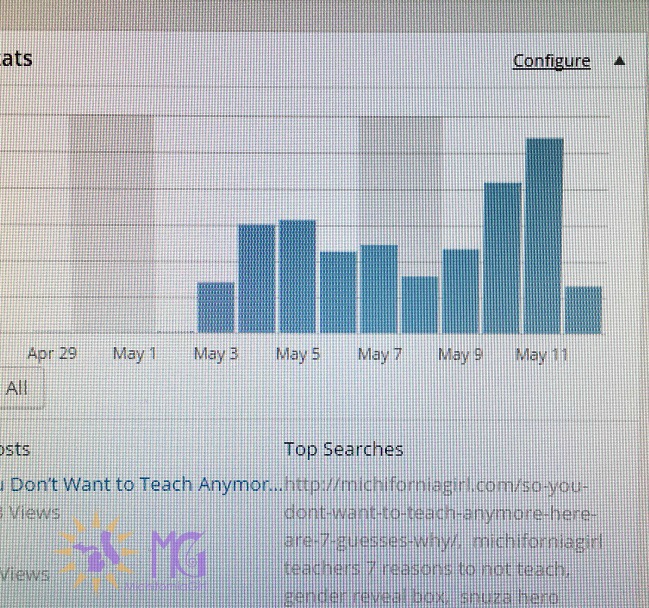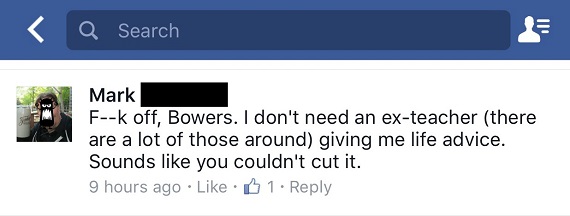This is the post AFTER the post that sort of went viral.
The headline should actually contain a question mark and a hefty dose of even more uncertainty: “Um, I’m Not Totally Sure…But What DOES Happen When Your Post Goes Viral?” Like, I’m asking you. This isn’t a how-to. This is a legitimate question. What am I supposed to do?
I guess I should probably start with a hearty welcome to all the new people, since there are a LOT more of you here now. I’m so grateful that you not only stopped by, but also decided to stay! Of course, because I’m a worrier, I’m super concerned that I might be unprepared to keep you all entertained. While I attempt to get my bearings, here is a dancing monkey.
I do tend to be long-winded. I know this. So I’ll make a real effort to keep this one brief-ish — the viral post was more than 3400 words long and you slogged through that (thank you!) and we all just need a break. But I want to tell you what’s been happening since I hit “publish,” as well as a few surprising things I’ve learned about kinda-sorta going viral.
I’ll start with the innocuous stuff, because it might take me a minute to calm down enough to discuss the rest.
Virality doesn’t always look like a wildfire.
I used to assume that all viral posts just BLEW UP within the space of one overnight sharing frenzy. Sometimes it definitely happens that way, as it did for the guy who posted a photo of his sick child and became the most popular person on the Internet over the weekend. (Does anyone else find this more horrifying than hilarious, or am I just freaked out because I’m emetophobic? In any case, numbers-wise, the teacher post was DOMINATED by toddler puke — so, you know, “viral” is clearly a relative term.)
Anyway, mine seemed to just pedal steadily uphill, although I could tell from the very beginning that this post was behaving differently from the rest. Generally, my site gets a brief mini-surge of traffic when I post new content, and then dies back down within a day or two. Not this time.

Believe it or not, there ARE several page views before May 3…but they look pretty much invisible by comparison.
The numbers were different from the start, too. Even on Day One, the page views were seven times more than anything I’d ever seen in my analytics, and kept climbing — the all-time high happened more than a week later. In the past, I sometimes tried to track down and thank anyone who took the time to share my work, but I realized my post had completely gotten away from me when I could no longer find all the places it existed.
It really took on a life of its own when The Huffington Post ran a modified version. At the time of this posting, that rendition alone has generated over 107,000 likes and shares, and even spent a few days as one of the six “Most Popular” posts on their entire site.

That was unexpected.
It is exciting and fascinating and exhilarating. At first.
In the beginning, sharers share for two reasons: to be supportive, and/or because they seem to like what they’ve read. Kind, insightful, encouraging comments rolled in — from people who knew me, initially, and then from perfect strangers. To my surprise, dozens of emails began to pour into my inbox; after a week, I couldn’t even keep up with them. They came from all around the world, written by current teachers, retired teachers, aspiring teachers, and non-teachers. It was fascinating and humbling to be suddenly privy to so many stories.
For me, one of the best parts was hearing from many of my former students. I hope they made it to the end of my post. I hope they understand that they’re the ones who make the job fulfilling and so immeasurably worthwhile.
And if any of you are reading this right now, just know that you rock. (There’s probably a much cooler way to express that sentiment…but hey, I’m old, and you’re not around to teach me all the teenage lingo, so it’s the best I can do for now.)
Send in the clowwwnnns trolls.
You guys. My blood pressure is already spiking.
When The Huffington Post featured the piece on their HuffPost Education Facebook page, I was ecstatic. Six days later, when they featured it on their MAIN Facebook page — the one with over 7 million followers — I was afraid.
Once a post travels far enough, the people who see it are no longer friends, family, or distant acquaintances. They are barely related by the six degrees of separation, and they are under no obligation to love you. That’s fine. You can’t please everyone/haters gonna hate/insert similar cliché here. However, this blog has only been live for about a year, and I was comfortably anonymous for half of that, and I don’t think I spent enough time thickening my skin.
Ugly words on sites as massive as The Huffington Post are to be expected. But I was confounded by the people who came directly to my blog simply to tell me off — this is (was?) my safe space, so it felt a little like someone had broken into my home just for the sake of vandalism. Of course, I realize I am happily, willingly flinging my words into public webspace, but just because the porch has a welcome mat doesn’t mean I hope my guests will spray graffiti on the walls and defecate all over the kitchen floor.
I wanted to delete the negative reactions — to just hit “UNAPPROVE!” and watch them vanish — but I left them up. Those comments are important examples of the public perception of teaching, which, in many cases, appears to be Problem Zero.
In an attempt to toughen up, I started to read the Huffington comments and also took a look at what people were saying when they shared the article. The response was overwhelmingly positive (which still has me in a bewildered state of awe), but every so often I saw something that stung. People called me “whiny.” “A griper.” They said I obviously couldn’t hack it as a teacher and that it was a really good thing I left. They called for “more people like you” to leave the system, and they asked, “How’s your summer going? Quit your bitching!” And then things got personal.

Okey-doke, then. That’s when I decided to take a comment-reading hiatus.
Blatant vulgarity aside, there were three things that came up enough times to warrant a response. You know how, at conferences, teachers sometimes joke that they never get to see the parents they need to see? This is kind of like that. The people I wish would read this probably won’t, but I can’t help it. I have to get this off my chest.
1. I was not “driven out of the profession” because of my working conditions.
I left teaching because my husband’s job spurred a cross-country move when I was six months pregnant. With circumstances being what they were, I thought it might be the right opportunity to follow a dream I’ve had since I was three years old and pursue my writing goals.
The opening sentence of the Huffington Post version outright states why I left, but some people insisted that I was “no longer up to the challenge and sacrifice of teaching.” This makes me sad — not only because it’s untrue, but mostly because I’m still an English teacher in my bones and, you know, reading comprehension.
2. My daughter has a medal.
A handful of people were absolutely appalled by this, that I had the audacity to talk about the Trophy Generation and then admit to something so dastardly. And maybe it was indeed The Great Parenting Fail of the 21st Century to buy my then-two-year-old a Turkey Trot medal, but I hope not.
Sometimes, of course, it is wonderful and necessary to recognize children for their effort alone. As parents, we are allowed to gush and praise and cheer, because those are our kids, and that’s our job.
I did that. I do that. I just wanted to tell my child-rearing counterparts: I get it.
As is the case in so many life situations, though, I think self-awareness and balance are key here.
Although I’m pretty sure it’s currently buried at the bottom of the “Stuffed Animals” bin, that medal totally exists. It does. But that doesn’t mean I am afraid to tell my daughter when she can do better. It doesn’t mean I will charge the softball field in a fury to scream at the fifteen-year-old umpire who tells her she has struck out. It doesn’t mean it’s the instructor’s fault if she doesn’t get a ballet solo. And it definitely doesn’t mean that I will disregard what her teachers say, or berate them while she stands by with a smirk, or turn a blind eye when it is time for her to take responsibility.
Let’s put it this way: the child is three, and the word “consequence” has been a part of her vocabulary for months.
But I did buy her a medal last fall. I definitely did that.
3. To inform. To entertain. To persuade. To complain.
In class, we often ask our students to surmise the “author’s purpose” based upon inferences and context clues. Sometimes it can get confusing, so let me dispense with the conjecture.
I did not write the article to “convince people to quit.” I did not write it to prove that teaching is THE HARDEST JOB IN ALL THE LAND, and I certainly did not write it to complain. When you’re no longer a part of the system, there’s not much to “complain” about, actually — but that doesn’t negate the deep-rooted need for change, and that’s part of what I was hoping to address.
Any profession on earth could have its own “7 Reasons” article. EVERY job is difficult in its own right, and in ways that people outside the circle could never understand. But teaching happens to be one of those very public professions that people believe they understand, and I thought it was important to invite everyone into the circle for a little while.
I was lucky to land in a fantastic district for those twelve years. I loved it — the town and the staff and the students, all of it — and the point is that even in the best districts there are systemic things that need to be fixed. There are so many more stories. Those educators who continue to add to the conversation are crucial, because we need a fuller picture in order to determine how to fix the systemic things.
Beyond that, my words were born of commiseration and a fierce, intense nostalgia. I miss my work with a profundity I did not expect.
I was hoping to remember everything, the pros and the cons, because after a year it feels uncomfortably far away. I was hoping to do some reminding — to remind myself of who I was once, to remind educators that they are not alone in feeling that something is broken, to remind people that it’s important to seek to understand even when they’re sure they already know.
And I was hoping to remind the teachers still in the trenches: despite those behind-the-scenes difficulties, you are doing wonderful things. Thank you for that. You are often undervalued and unappreciated and misunderstood, but you are likely someone’s unsung hero. Maybe many, many someones.
Put that feather in your “Highly Effective” cap, folks. It’s invisible for now, but it’s a start.

Great article!! I’m a new follower and love your blog. Keep up the great work.
Welcome! I’m really glad you’re here, and thank you for taking the time to introduce yourself via comment! It’s so great to meet new readers. 🙂
Just wanted to pop in and leave a nice comment 🙂 Your writing is fantastic. A breath of fresh, honest air. I am here because of your wedding challenge post and decided to poke around a few of your other posts. Please don’t let negative comments and trolls keep your from pursuing your passion.
Thank you for your positivity! Needed this today.
I’m not exactly sure how I stumbled here… maybe it was a FB post about not participating in the “Good Marriage” chain mail-y thing. Which, by the way, was spot on too. But I stayed for the 7 reasons because I’m a teacher. I’m a teacher in a tiny parochial school who could make more money working at probably any fast food place or retail store. Yes, I teach in this school because I love the parochial setting and sharing my faith. That doesn’t put food on the table though, you know? So I stay because it’s one of the few schools where I get to teach children, not data. Well, it’s true of the public school’s summer school program so I also teach there (and make a lot more money than my “full time” teaching job). My point is that even in the midst of having the freedom and flexibility to teach what’s in the book and what’s not in the book, to incorporate music/drama/exercise/cooking, to be as creative as I want to be, some people are not going to be happy. So your 7 reasons rang true with me as well. I think the problem with the ‘trolls’ in the comments is that they didn’t understand the very basics of reading an article — who is the audience? Guess what; if you’re not a teacher, YOU ARE NOT the audience. Simple as that.
Thanks for the great writing. I, too, have a three year old (my youngest). Between that and teaching, plus starting more freelance and just-for-fun writing, I’m about to lose my mind. Glad to see I’m not the only one. 😉
I, too, found your post because of some words that I may or may not have typed into Google. 😉 Thank you. It felt good to know somebody gets it. Especially the “responsibility without authority“ part. Any teacher who can motivate kids these days is a god among humans. Or they are blessed with the most supportive parents and admin any teacher could ask for. Education in this country will become effective again when we all get on the same team, the team that says, “All students can learn if we design good instruction and hold the students accountable as well as the teachers.” I’ve worked in two very different districts, and this has been the number one difference I’ve seen: when parents and administrators hold kids accountable and support teachers, the outcomes are better.